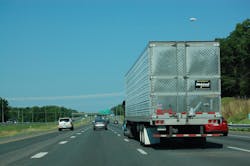A bill introduced this week by U.S. Representative Erik Paulsen (R-Minnesota) aims to more firmly establish the ability to use independent contractors across a variety of industries – especially in trucking.
The bill, H.R. 3396, amends the Internal Revenue Code of 1986 to provide standards for determining a worker’s employment status, according to the Customized Logistics and Delivery Association (CLDA); putting forth a two-part test that establishes a formal definition of who is an independent contractor while creating “safe harbor” provisions within the U.S. tax code to more concretely define the relationship between an independent contractor and the service recipient and/or payor.
“Currently, it is difficult and overly complicated for businesses to use independent contractors, which limits companies’ growth and individuals’ work,” noted Rep. Paulsen in a statement. “This legislation … provides clarity and guidance for businesses so they know they are properly classifying independent contractors without fear of IRS [Internal Revenue Service] penalties.”“This bill provides much-needed clarity and guidance for businesses that partner with independent contractors to provide the flexibility of their workforce they need to meet customer needs,” added John Benko, the CLDA’s president, in a statement. “Independent contractors are the backbone of our industry, allowing us to be responsive and flexible enough to meet changing customer demands. They are a key part of this nation’s supply chain and our country’s ability to remain competitive in today's economy.”
Ultimately, he said, this bill would “bring clarity and transparency” to the definition of an independent contractor, enabling industries that depend on them to remain in compliance with tax rules as well as properly classify them for employment purposes.
Such “clarity” would come from adding a new section to the Internal Revenue Code (Section 3511) via this bill to assist businesses with compliance and proper classification of individuals as independent contractors.
In 1978, Congress enacted Section 530 of the Revenue Act of 1978 to provide a safe-harbor for businesses with respect to the employment classification of individuals, CLDA noted, which developed as a result of inconsistent employment tax audits where the definition of “employee” was unclear.
While Congress affirmatively acted to make the Section 530 Safe Harbor permanent in 1982, the group said this issue wasn’t included in tax reform in 1986 and therefore was not codified as part of the Internal Revenue Code.
H.R.3396 would fix that by first putting “safe harbor provisions on a firmer ground by placing it in the Internal Revenue Code and then providing “clarity” to businesses about what constitutes an independent contractor with two new sections in the Internal Revenue Code: Section 3511, as mentioned previously, would include “safe harbor” provision, while Section 3512 establishes the two-part test to determine whether a service provider and service recipient are not employee and employer respectively.




